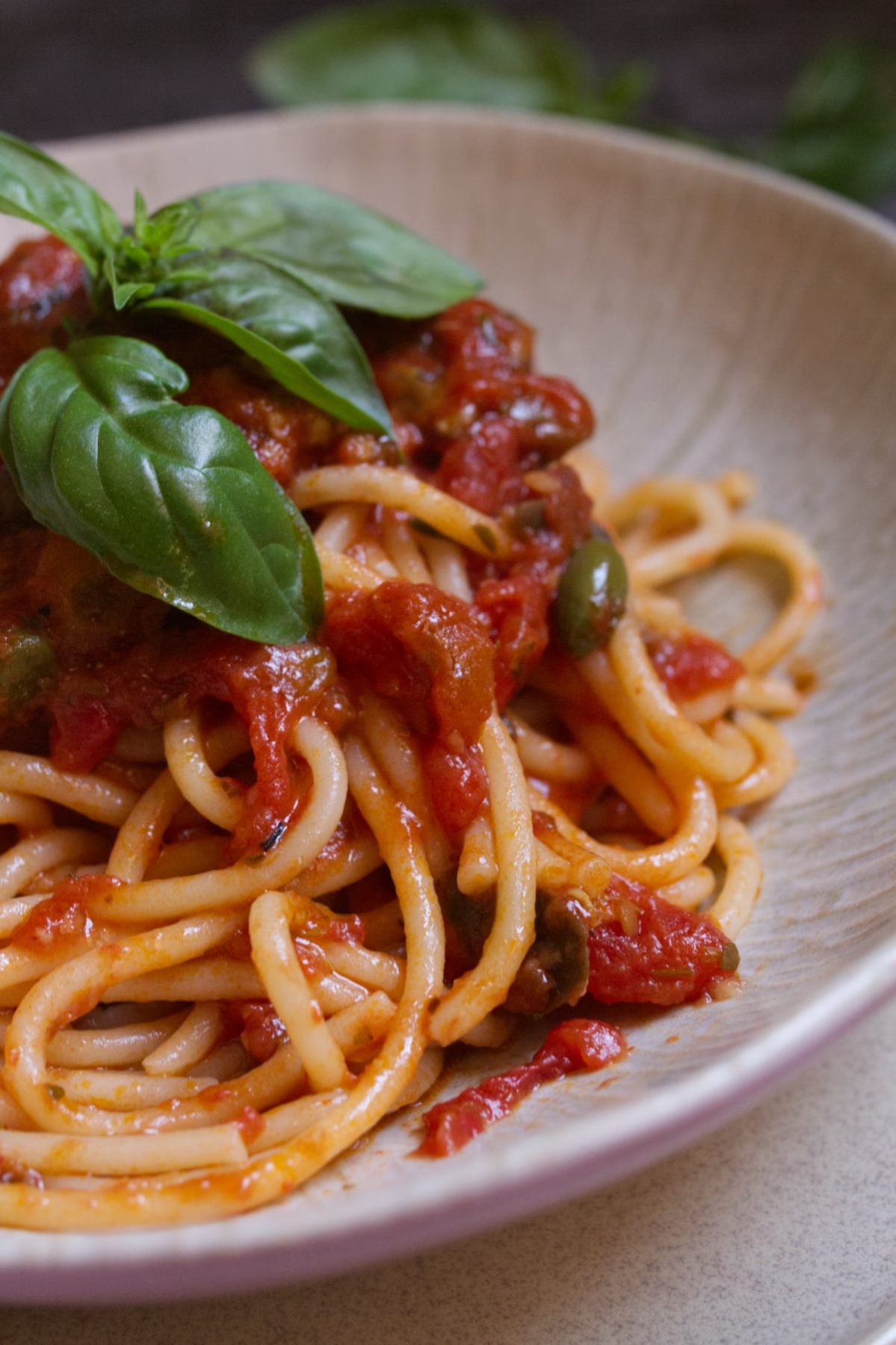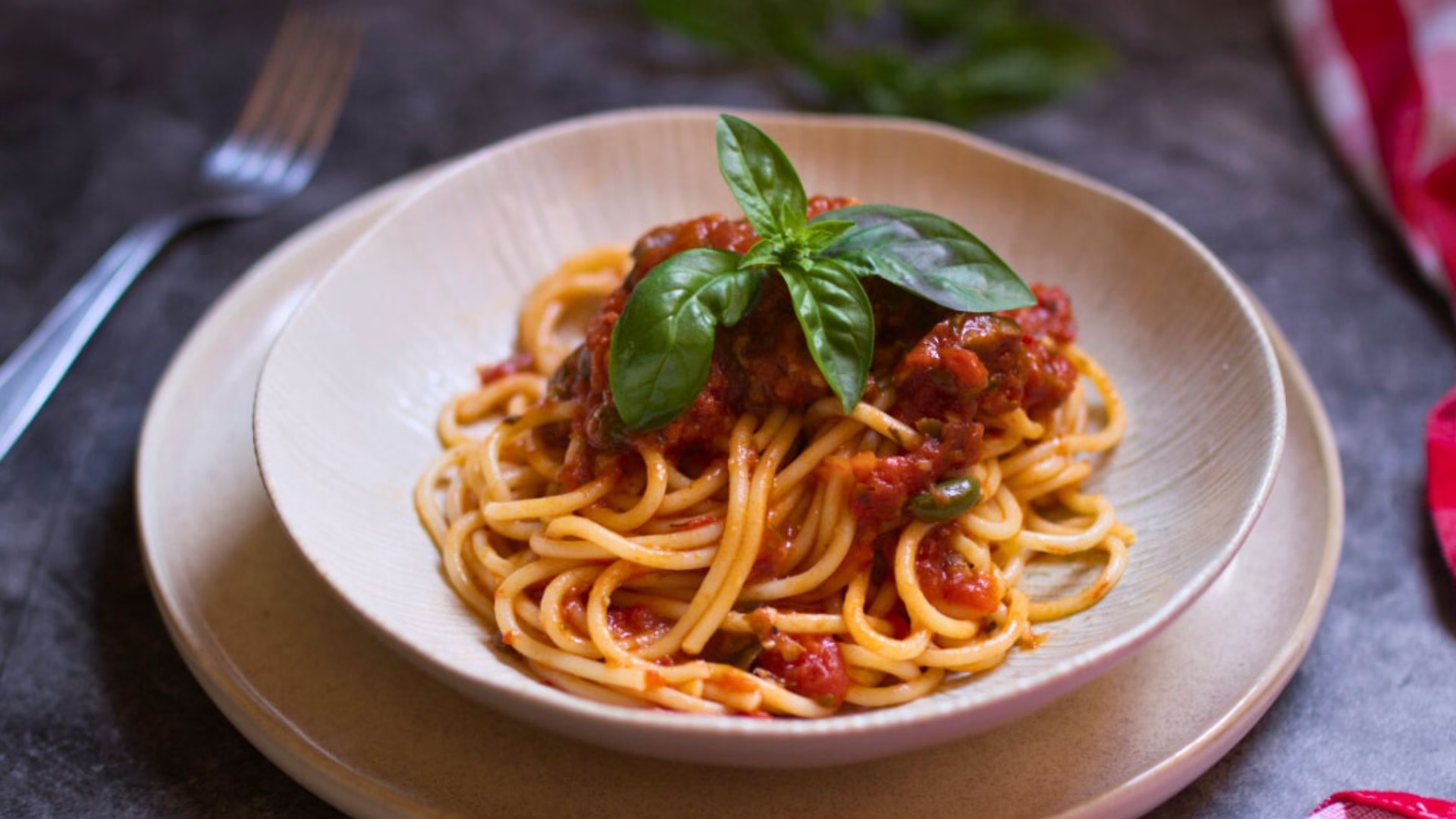If you’ve ever wondered how to make homemade spaghetti sauce – Spaghetti alla puttanesca that tastes like it came straight from a rustic Italian kitchen, this recipe is your new go-to.
Bursting with briny olives, capers, and melt-in-your-mouth anchovies, puttanesca is the bold, no-nonsense pasta sauce that turns a handful of pantry staples into something unforgettable. With just a few ingredients and a little simmer time, you’ll create a rich, vibrant sauce that clings beautifully to every strand of spaghetti.
Let’s dive into this iconic dish and bring Southern Italy right to your stovetop.
Italian | Main | Spaghetti | Tomatoes | Sauce
Table of contents:
- How to Make Homemade Spaghetti Sauce – Spaghetti alla puttanesca
- Origin of Puttanesca Sauce
- Which Anchovies Work Best in Fish Puttanesca
- What to Do if Puttanesca Sauce is Too Briney or Salty
- Nutrition Facts (Per Serving)
- FAQs
- 1. What is Spaghetti alla Puttanesca?
- 2. Do anchovies make the sauce taste fishy?
- 3. Can I make puttanesca without anchovies?
- 4. How long should I simmer puttanesca sauce?
- 5. How do I reduce saltiness if the sauce is too briny?
- 6. What pasta works best with puttanesca?
- 7. Can I add protein to this recipe?
- 8. Is puttanesca sauce spicy?
- 9. Can I make puttanesca sauce in advance?
- 10. Are San Marzano tomatoes necessary?
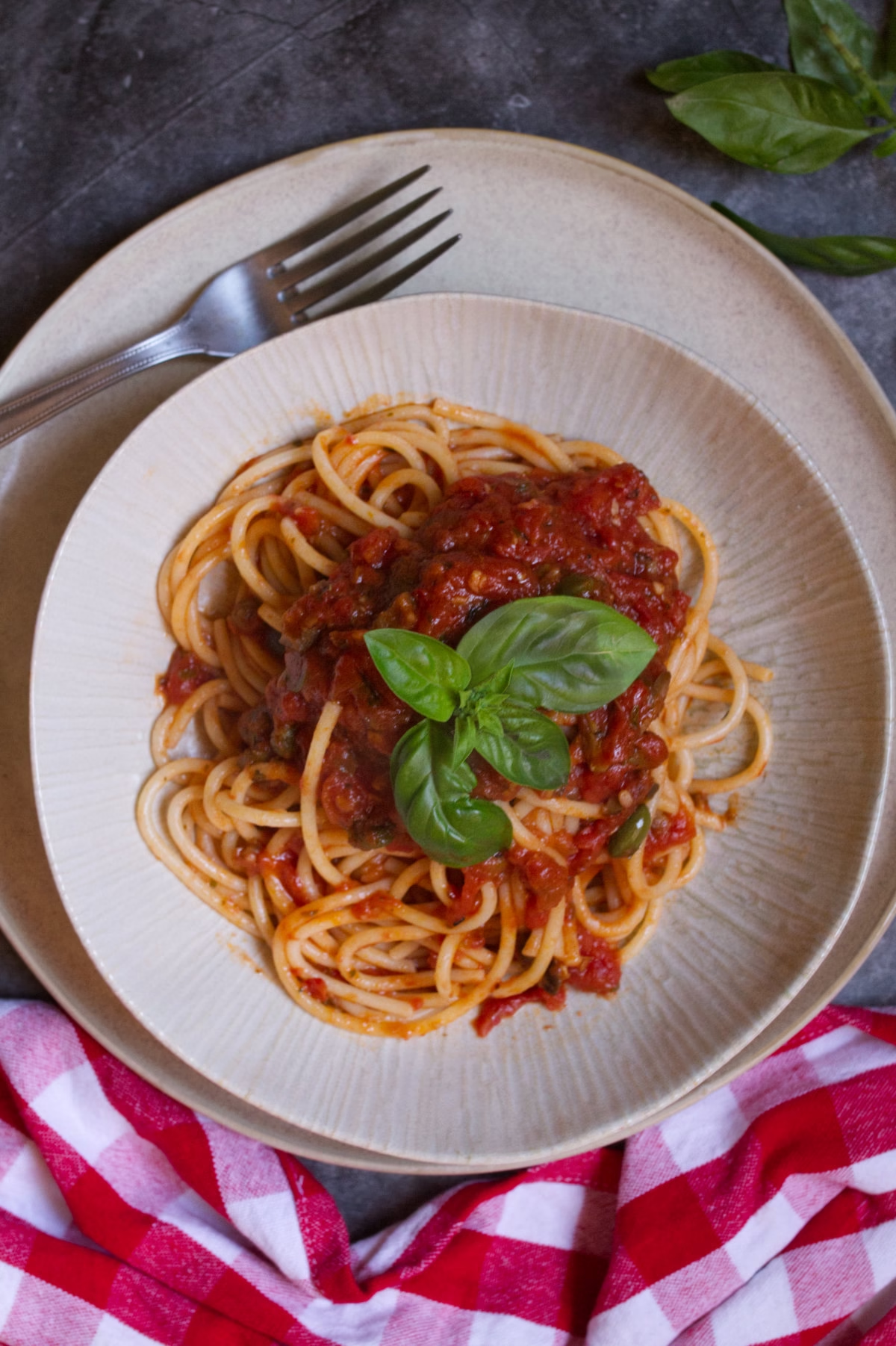
How to Make Homemade Spaghetti Sauce – Spaghetti alla puttanesca
- Spaghetti (Per person main dish: 2 oz. / 56 grams)
- Extra Virgin Olive Oil
- 1 lemon, juiced
- 4-8 anchovy fillets in olive oil (see notes below on what anchovies to use)
- 5-6 garlic cloves, minced
- 1 (28-ounce) can whole peeled tomatoes (ideally San Marzano tomatoes if you can find them)
- ½ cup pitted black Olives (Kalamata or similar)
- 2 Tbsp Capers, drained
- 1 Tbsp Dried Oregano or Italian seasoning
- Salt and Pepper, to taste
- 1 tsp Chili pepper flakes (optional)
- Small bunch of fresh parsley leaves (or basil), for garnish
Looking for a Puttanesca version with some protein?
🐔Check out our Chicken Puttanesca recipe: https://youtu.be/m0htS7kkArQ
Or
🐟Fish Puttanesca: https://youtu.be/Vuhx0AwjfVg
___Equipment___
- Ceramic Garlic Grater Plate
- Chef Knife
- Cooking tongs
- Wooden Cutting Board
- Meat thermometer
- Lemon Juicer
- 12-Inch Stainless Steel Frying Pan
- Wooden spatula
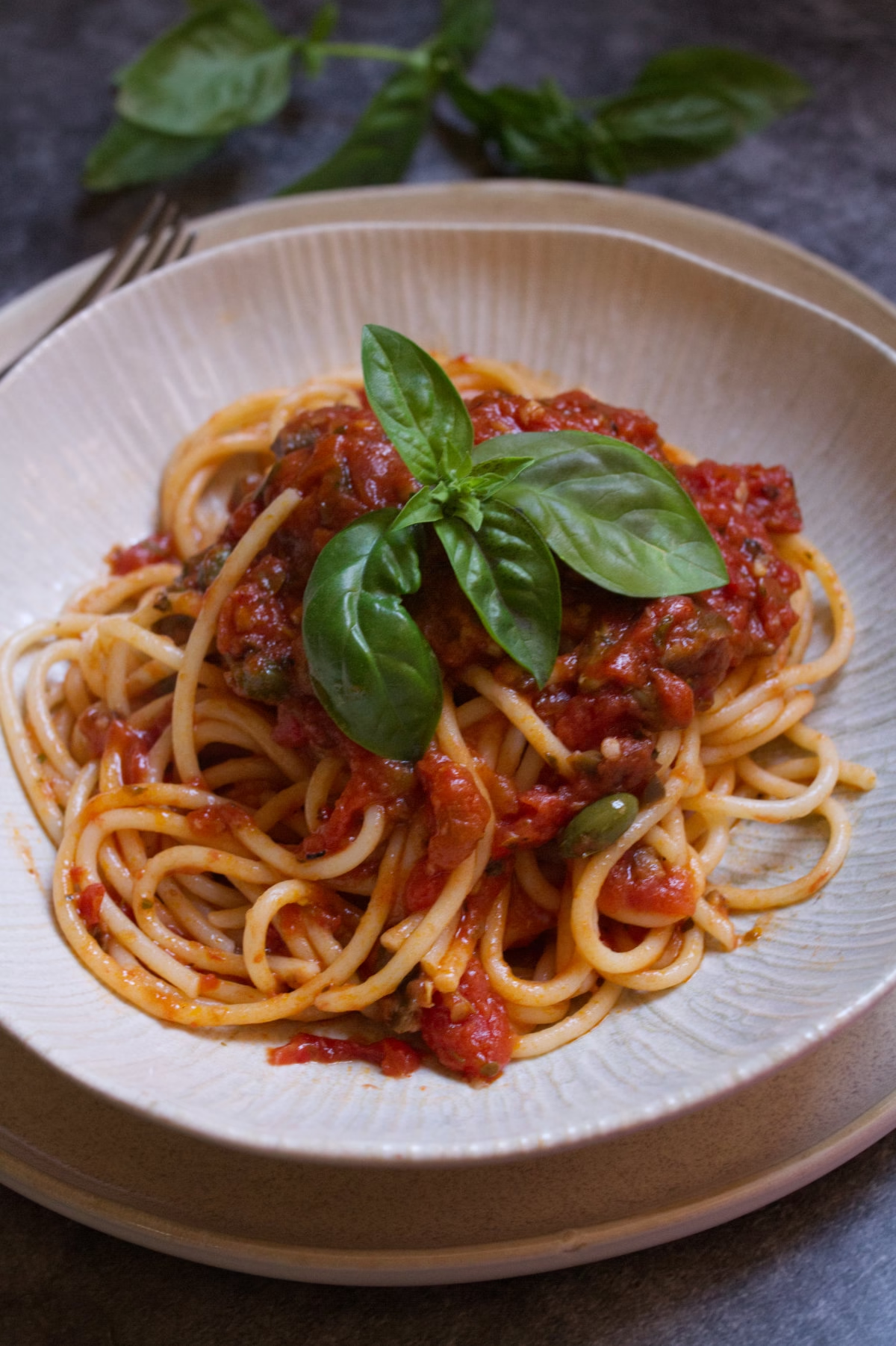
Step-by-Step Instructions
- Heat some oil in a large deep sided skillet ot pan on medium heat.
- Add the garlic and cook for 2 minutes or until fragrant, then add the olives, capers and anchovies. If using chili flakes, add them now and stir through.
- Use a wooden spatula to break apart the anchovies and then stir into the other ingredients.
- Add the whole tomatoes (and juice) and 1 tsp of oregano. Break the tomatoes apart with a spatula and stir through.
- Bring to a simmer and cook for around 20-30 minutes as a minimum (longer the better!).
To serve
Serve with Spaghetti or Pasta.
Origin of Puttanesca Sauce
Puttanesca sauce — known in Italian as sugo alla puttanesca — comes from southern Italy, most often linked to Naples (though some say it started in Rome). It’s a bold, rustic sauce made with simple pantry staples: tomatoes, garlic, olives, capers, and anchovies.
The name “puttanesca” literally translates to “in the style of the ladies of the night,” and that’s where the stories often get colorful. One popular theory says the sauce was invented by Neapolitan women who worked late and needed a quick, fragrant meal they could make from what they had on hand — inexpensive ingredients that didn’t spoil easily.
Another version suggests the name came from the tempting aroma of the sauce, said to be so enticing it could lure people in from the streets!
No matter which story you believe, spaghetti alla puttanesca became a staple of Italian home cooking — a dish that’s bold, briny, and unapologetically full of flavor.
More Italian Sauce Recipes:
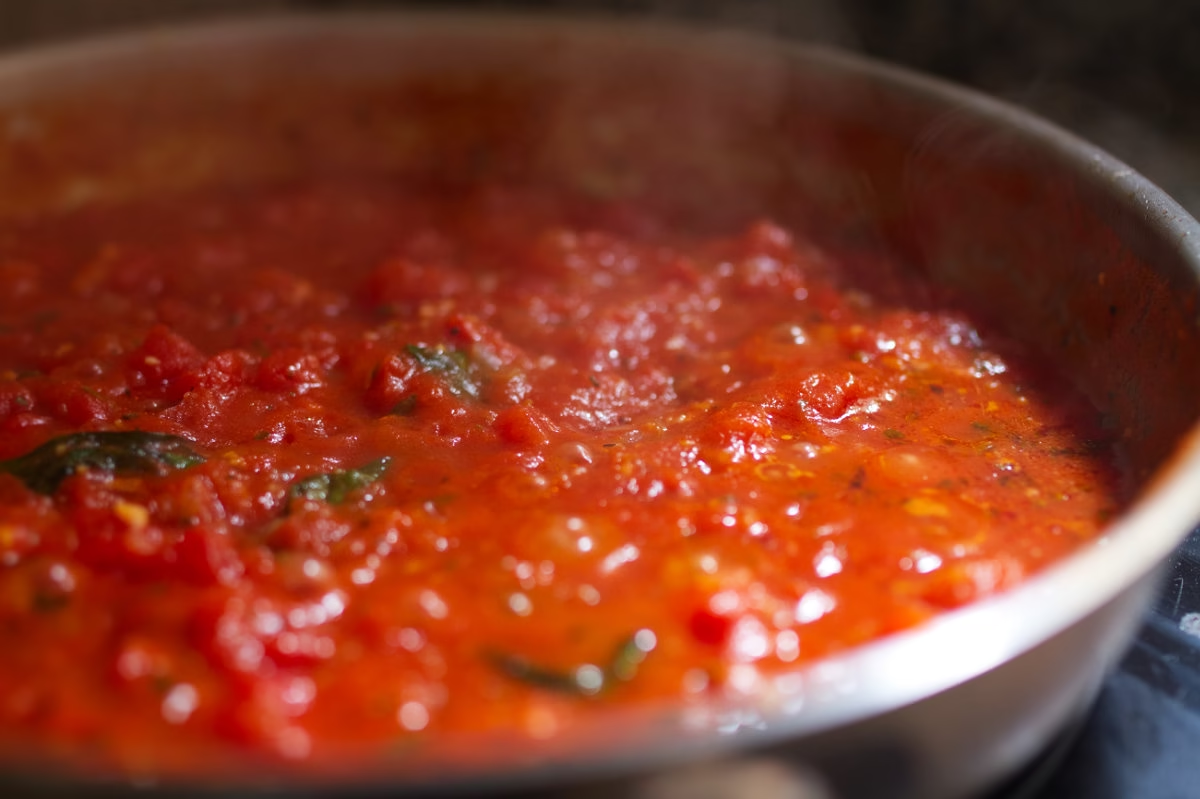
Tomatoes to use for Puttanesca Sauce
For puttanesca, the tomatoes are the backbone of the sauce—so the variety really matters. If there’s one ingredient to spend some time hunting down, it’s some good quality tomatoes.
Italians reach for San Marzano tomatoes, prized for their naturally sweet flavor, low acidity, and meaty texture.
Here are the best options:
Cento Certified San Marzano Whole Peeled Tomatoes, 28 Oz (Pack of 6)
Crushed tomatoes (shortcut): A convenient option if you want a smoother sauce without blending whole tomatoes yourself.
San Marzano (best choice): Grown in Italy’s Campania region, these tomatoes are D.O.P.-certified and considered the gold standard. They break down into a silky, balanced sauce.
Whole peeled canned tomatoes: If San Marzano isn’t available, choose a high-quality brand of whole peeled tomatoes (like Cento, Muir Glen, or Mutti). Whole tomatoes tend to be less processed than diced or crushed, giving you more control over texture.
Fresh ripe plum or Roma tomatoes: Great in summer when tomatoes are at their peak. They’ll need to be peeled and simmered longer to achieve the same depth as canned.

Which Anchovies Work Best in Fish Puttanesca
Anchovies are what give fish puttanesca that rich, savory flavor everyone loves. Don’t worry — they don’t make the dish taste “fishy.” Instead, they melt right into the sauce and add a deep, delicious umami kick.
Here are your best options:
1. Anchovy Fillets in Oil (the classic choice)
These are the easiest and most common type to use. They quickly dissolve into the sauce, leaving behind tons of flavor. Try to grab a good-quality brand from Italy or Spain — you’ll really taste the difference.
2. Salt-Packed Anchovies (for extra punch)
These come packed in salt and have a stronger, more intense flavor. You’ll need to rinse and fillet them before using. They’re amazing if you want a bolder taste, but remember — they’re saltier than the oil-packed kind.
3. Anchovy Paste (super easy option)
If you don’t want to deal with fillets, anchovy paste is your best friend. Just squeeze in a bit at a time until it tastes right.
💡 Quick Tip:
Anchovies, olives, and capers are all naturally salty, so go easy on the salt when seasoning your fish. Taste the sauce before adding any extra — that way, you get all the flavor without overdoing it.

What to Do if Puttanesca Sauce is Too Briney or Salty
A too-briny puttanesca sauce can happen easily, since you’ve got anchovies, capers, and olives all bringing salt and intensity to the party. We suggest only seasoning this sauce with some salt and pepper at the end of the cooking process (there’s plenty of salty ingredients added already).
When things don’t turn out as planned and your Puttanesca is too briney, fortunately, it’s easy to fix without losing the sauce’s character.
Here’s what to do, step-by-step 👇
🧂 1. Balance and dilute the saltiness
- Add unsalted crushed tomatoes or tomato purée — This is the best fix. Stir in ½ to 1 cup, simmer a few minutes, and taste again. It stretches the sauce and mellows the salt.
- Add a splash of water, white wine, or low-sodium stock — Loosens the sauce and lightens the brine. Simmer briefly to integrate.
- Don’t add salt until the very end (or at all) — Remember, the fish or pasta will bring some too.
🍅 2. Add sweetness and acidity for balance
- A pinch of sugar can soften the edges and bring a balance of sweetness and savory.
A splash of lemon juice or red wine vinegar adds brightness that masks brininess rather than increasing it.
Nutrition Facts (Per Serving)
Below is an estimated Nutrition Facts table (per serving) for Spaghetti alla Puttanesca, based on a standard recipe with 2 oz (56 g) dry spaghetti and typical quantities of oil, anchovies, olives, capers, and canned tomatoes.
Values are approximate and based on a 2,000-calorie diet.
| Nutrient | Amount | % DV |
| Calories | ~420 kcal | 21% |
| Total Fat | 18 g | 23% |
| Saturated Fat | 2.8 g | 14% |
| Trans Fat | 0 g | — |
| Cholesterol | 10 mg | 3% |
| Sodium | 1,210 mg | 53% |
| Total Carbohydrates | 52 g | 19% |
| Dietary Fiber | 5 g | 18% |
| Total Sugars | 8 g | — |
| Added Sugars | 0 g | 0% |
| Protein | 12 g | 24% |
| Vitamin D | 0 mcg | 0% |
| Calcium | 90 mg | 7% |
| Iron | 3.3 mg | 18% |
| Potassium | 640 mg | 14% |
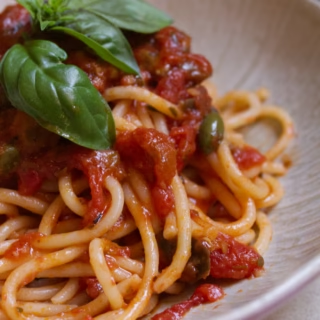
Homemade Spaghetti Sauce Recipe – Spaghetti alla puttanesca
Equipment
- Ceramic Garlic Grater Plate
- Chef Knife
- Cooking tongs
- Wooden Cutting Board
- Meat thermometer
- Lemon Juicer
- 12-Inch Stainless Steel Frying Pan
- Wooden spatula
Ingredients
- Spaghetti Per person main dish: 2 oz. / 56 grams
- Extra Virgin Olive Oil
- 1 lemon juiced
- 4-8 anchovy fillets in olive oil see notes below on what anchovies to use
- 5-6 garlic cloves minced
- 1 28-ounce can whole peeled tomatoes (ideally San Marzano tomatoes if you can find them)
- ½ cup pitted black Olives Kalamata or similar
- 2 Tbsp Capers drained
- 1 Tbsp Dried Oregano or Italian seasoning
- Salt and Pepper to taste
- 1 tsp Chili pepper flakes optional
- Small bunch of fresh parsley leaves or basil, for garnish
Instructions
- Heat some oil in a large deep sided skillet ot pan on medium heat.Extra Virgin Olive Oil
- Add the garlic and cook for 2 minutes or until fragrant, then add the olives, capers and anchovies. If using chili flakes, add them now and stir through.4-8 anchovy fillets in olive oil, 5-6 garlic cloves, ½ cup pitted black Olives, 2 Tbsp Capers, 1 tsp Chili pepper flakes
- Use a wooden spatula to break apart the anchovies and then stir into the other ingredients.
- Add the whole tomatoes (and juice) and around 1 tbsp of oregano. Break the tomatoes apart with a spatula and stir through. Add a squeeze of lemon juice and season to taste1 lemon, 1 28-ounce can whole peeled tomatoes (ideally San Marzano tomatoes if you can find them), 1 Tbsp Dried Oregano or Italian seasoning, Salt and Pepper
- Bring to a simmer and cook for around 20-30 minutes as a minimum (longer the better!).Spaghetti, Small bunch of fresh parsley leaves
Video
Notes
Tomatoes to use for Puttanesca Sauce
For puttanesca, the tomatoes are the backbone of the sauce—so the variety really matters. If there’s one ingredient to spend some time hunting down, it’s some good quality tomatoes. Italians reach for San Marzano tomatoes, prized for their naturally sweet flavor, low acidity, and meaty texture.FAQs
1. What is Spaghetti alla Puttanesca?
Spaghetti alla puttanesca is a bold Italian pasta dish made with tomatoes, garlic, olives, capers, and anchovies. It’s known for its rich, salty, savory flavor and quick cooking time.
2. Do anchovies make the sauce taste fishy?
No. Anchovies melt into the sauce and create depth and umami, not a fishy flavor. Most people don’t even realize they’re in the dish.
3. Can I make puttanesca without anchovies?
Yes, but the flavor will be less complex. You can substitute a teaspoon of miso paste or a splash of Worcestershire sauce for a similar savory kick.
4. How long should I simmer puttanesca sauce?
A minimum of 20–30 minutes works, but longer simmering (up to 45–60 minutes) deepens the flavor and improves texture.
5. How do I reduce saltiness if the sauce is too briny?
Add unsalted tomato puree, water, or a splash of white wine. You can also add lemon juice or a pinch of sugar to balance the flavor.
6. What pasta works best with puttanesca?
Spaghetti is traditional, but linguine or bucatini also work well because they hold the sauce beautifully.
7. Can I add protein to this recipe?
Yes! Puttanesca goes perfectly with chicken, shrimp, salmon, cod, or tuna. It pairs especially well with our Chicken Puttanesca and Fish Puttanesca versions.
8. Is puttanesca sauce spicy?
It can be if you add chili flakes. The spiciness is optional and can easily be adjusted to your taste.
9. Can I make puttanesca sauce in advance?
Absolutely. It stores well for 3–4 days in the refrigerator and tastes even better the next day as the flavors deepen.
10. Are San Marzano tomatoes necessary?
No, but highly recommended. If unavailable, any high-quality whole peeled tomatoes will work well.
